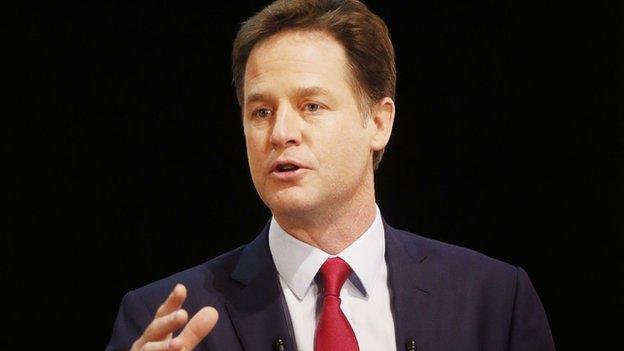Nick Clegg defends 'pragmatic' deficit reduction plan
- Published

The government was right not to be "dogmatic" in trying to balance the books in the current parliament, Deputy Prime Minister Nick Clegg has said.
But he said the Conservatives' post-election pledge to clear the deficit without tax rises was "nonsense".
Chancellor George Osborne plans to say how the UK will "stay on the course to prosperity" in his Autumn Statement.
Labour has said David Cameron and Mr Osborne have missed "every single target they set themselves".
The coalition government originally aimed to eliminate the deficit over the course of the parliament. Labour's pledge before the last election was to halve it in four years.
Election pledges
Mr Clegg said the government had been "consistent" when it became "obvious" that the deficit would not be eliminated in this parliament.
He said "no-one would have thanked us" if ministers had made deeper cuts in order to hit its target.
He told BBC Radio 4's Today programme clearing the deficit would "take a little longer" with "substantial savings" needed after May's election whoever is in power.
He predicted the deficit was likely to be "more or less halved" by the election, saying: "What I accept, of course, is if tax receipts are not as buoyant as predicted, then of course that has an effect.
"Time will tell whether that is a semi-permanent effect or a temporary blip, but it means that it comes down a little less than originally projected."
The three main Westminster parties are all pledging to balance the books by 2020.
The Conservatives and the Liberal Democrats want to reach an overall budget surplus by 2018/19, while Labour says it will reach a surplus not including capital spending by the end of the next Parliament.
Mr Clegg said the government's approach had been "a combination of pragmatism and consistency", but criticised the Conservatives' post 2015 plan to meet this target without raising taxes, accusing them of balancing the books "on the backs of the working-age poor".
Labour has claimed the government's "failure" to tackle low wages has cost the Treasury £116.5bn in lost tax receipts and welfare payments since 2010.
Mr Osborne will use Wednesday's Autumn Statement to update Parliament on his tax and spending plans, based on the latest predictions for the economy.
He will promise an extra £2bn in NHS funding, saying he can only make the commitment because the economy is strong.
- Published21 February 2014

- Published1 December 2014

- Published28 November 2014

- Published1 December 2014

- Published18 November 2014
